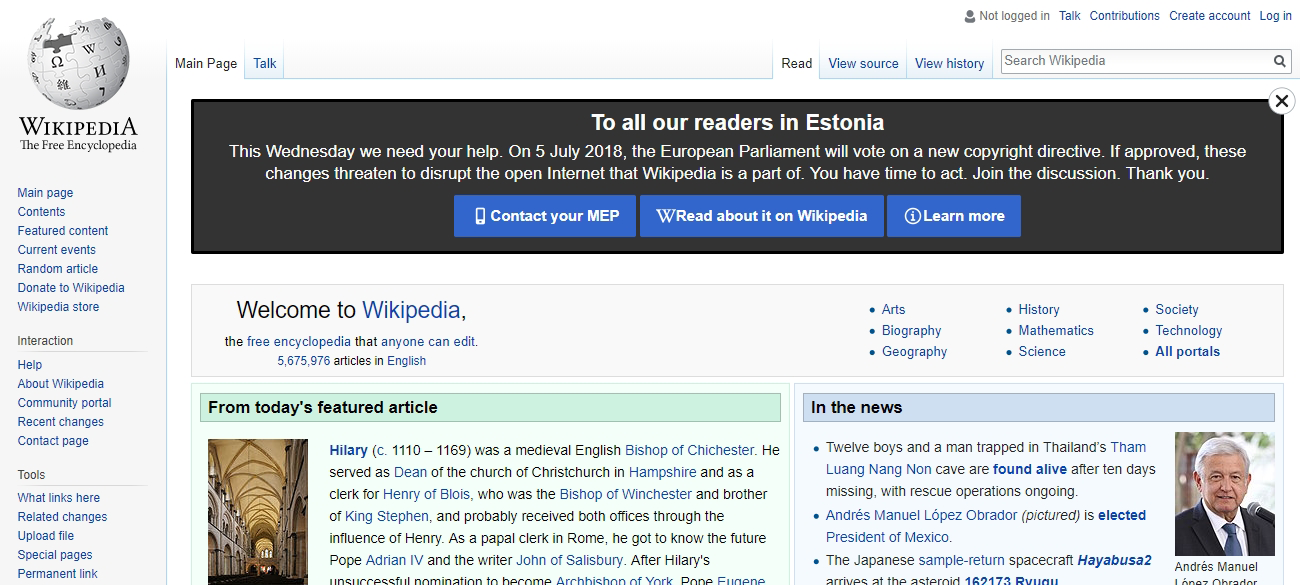The EU gets another opportunity to improve copyright rules
The EU gets another opportunity to improve a copyright proposal that would have threatened the open web.
On 5 July 2018, Members of the European Parliament (MEPs) rejected the mandate to proceed with a flawed proposal for an EU Copyright Directive that would have had detrimental effects to internet freedom, access to knowledge, and collaboration online. This vote means that the text of the draft Directive is open again for amendments to be proposed and voted on by Parliament, likely at the next plenary session on 12 September 2018.

The Wikimedia Foundation applauds the rejection of the mandate and the opportunity this offers for a wider discussion to create a balanced, modern copyright system for Europe. Prior to the vote on 5 July 2018, the Wikimedia Foundation Board of Trustees, more than ten Wikipedia language communities, and many Wikimedia chapters in Europe took a stand against the draft Directive. Some Wikimedians even took to the streets to protest and educate the public.
Wikipedia’s chapters ran messages asking European users to contact their MEPs or went dark for a day to protest the proposal. Unlike other online platforms, Wikipedia’s global community of volunteer editors makes decisions about how they want the site to be involved in policy debates that impact Wikipedia, access to knowledge, and the free and open internet. The banners and blackouts protesting the draft Directive were the direct result of Wikipedia’s volunteer editors making their voices heard through Wikipedia’s democratic decision to make a statement.
Of course, the Wikimedia movement was not alone in our protest to the Directive. Countless civil society stakeholders, technologists, creators, and human rights defender also spoke out against the proposal.
Wikimedia believes strongly that the draft Directive went too far to expand copyright and failed to provide critical protections for material that should be both free and public. The Foundation fears that the overbroad requirements in the draft Directive would actually lead to further dominance of the internet by large companies that have the resources to build burdensome filtering systems. This runs contrary to the vision of an open internet that fostered Wikipedia’s creation.
Now that the proposed copyright Directive is open for amendments once again, it is time to support improvements that harmonise copyright across the EU and preserve basic online freedoms. A groundswell of concern over this proposal led to its rejection in Parliament.
Let’s make sure that the next round of amendments takes these concerns into account and results in a copyright directive which will truly deliver a free and open internet for all.
Read more:
How the EU copyright proposal will hurt the web and Wikipedia (02.07.2018)
https://edri.org/how-the-eu-copyright-proposal-will-hurt-the-web-and-wikipedia/
Wikipedia blackout (04.07.2018)
https://commons.wikimedia.org/wiki/File:Wikipedia_blackout,_04.07.2018,_en.wp.jpg
Press Release: EU Parliamentarians support an open, democratic debate on Copyright Directive (05.07.2018)
https://edri.org/press-release-eu-parliamentarians-support-open-democratic-debate-around-copyright-directive/
(Contribution by Jan Gerlach, EDRi-member Wikimedia Foundation)


